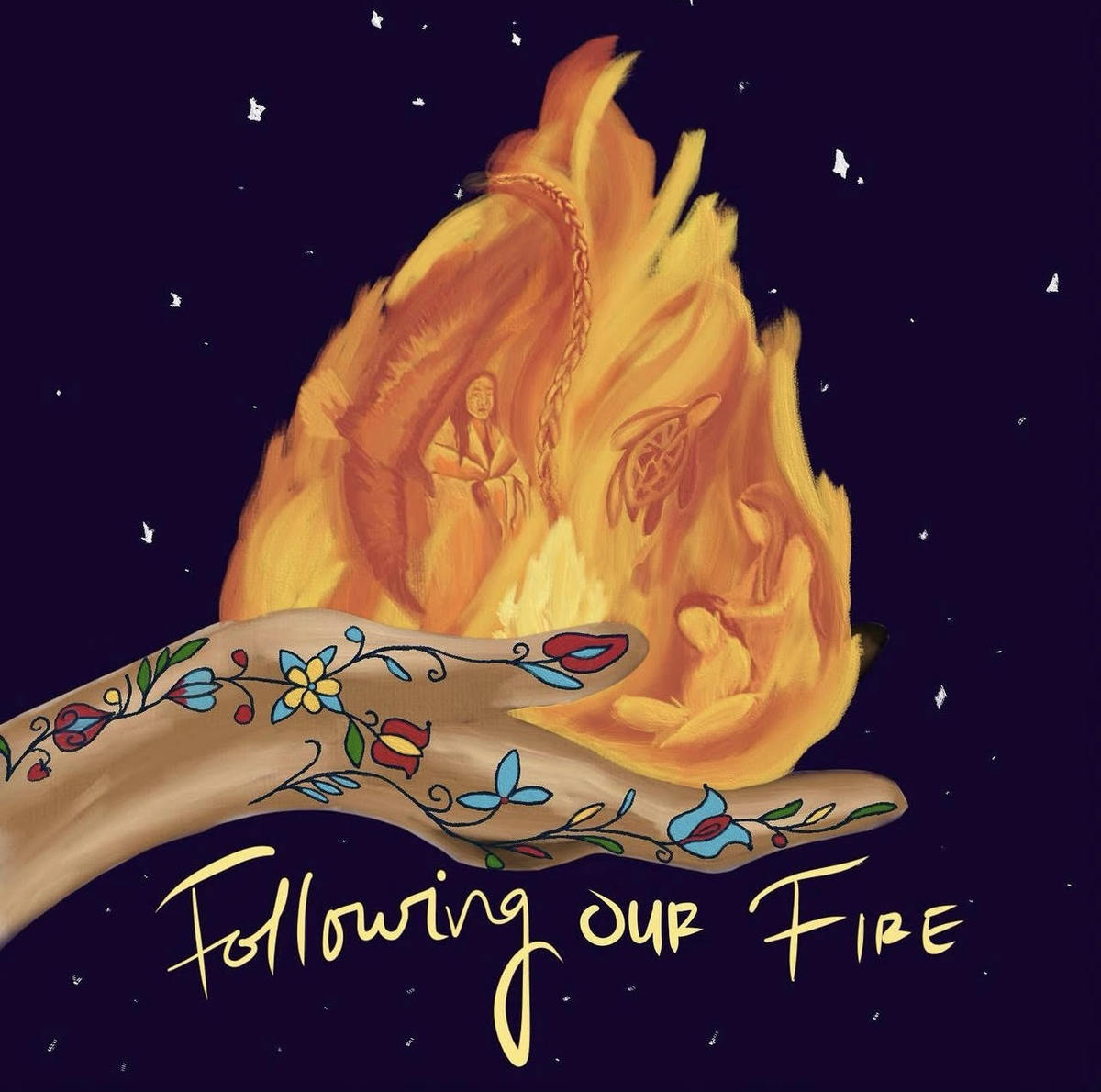“A space for Indigenous hope”: Student podcast seeks to change media representation of Indigenous narratives
Sunni Parisien ’25 is recharting the way media organizations approach Indigenous stories by centralizing diversity, imagination and changemaking.

Mikiala Ng, Contributing Illustrator
“I can feel myself searching for the answer that I’m running away from. Its truth feels too big to carry from one generation to the next.”
So begins Sunni Parisien ’25’s podcast “Following Our Fire,” which arrives at the intersection of her ongoing self-discovery journey and a desire to centralize Indigenous hope and love in American media. The first episode is available for download on Apple Podcasts and Spotify as of Nov. 4.
The podcast, which has been in the works since last November, is still in its budding stages. Future episodes, Parisien said, will focus on conversations with Indigenous leaders, journalists, youth and teachers about spirituality, colonization and history.
“I realized that most media for Indigenous people is about trauma and struggle, which is a very real thing,” she said. “[But] there should … also … be a space for Indigenous hope and the good in our lives that have been left to us, because there is a lot. It shouldn’t be just trauma porn.”
Parisien’s project, she said, is rooted in family and her tribe, the Turtle Mountain Band of Chippewa. She emphasized seeking inspiration from her people’s Seven Prophets story, which she first heard as a junior in high school. Every prophet had something to say about what was going to happen in the future, she explained.
When it came to the seventh fire, which is “the time of right now,” the prophets discussed that despite the loss and devastation confronting the tribe, there will come a people who will retrace the steps of their ancestors and reclaim the identities, teachings and practices that have been lost through colonization and assimilation, Parisien said.
Parisien, who also serves as a peer liaison at Yale’s Native American Cultural Center, hopes that the podcast will be a medium of a “radical imagination” that breaches the colonial framework and lens through which many Indigenous stories are currently seen in modern pop culture and media.
By inviting the original narratives of Indigenous community members and being an endeavor separate from the Yale institution, Parisien’s podcast returns sovereignty over tribal affairs to their rightful owners and creators. The decision to separate the project from Yale was a conscious one, with Parisien noting that the University should not receive credit for cultures and stories that it historically did not play a part in creating or supporting.
She frequently encountered this idea of “sovereignty” in an Ethnicity, Race and Migration course that she took with postdoctoral associate and soon-to-be associate professor Tarren Andrews, who is also an advisor on the project.
For Andrews, the podcast will hopefully serve as a “model for how other students who have personal, political, and cultural commitments to communities … within [and] beyond Yale” can make use of the resources at Yale to make their impact on communities where change “matters most.”
Andrews’s own introduction to Indigenous media at the University, she said, was through an opinion piece published in the News by Oscar Turner ’24 that called on Yale to introduce a Native American and Indigenous Studies major.
Amplified representation in a place like Yale is critical for shaping the way Indigenous peoples are then able to engage outside of this institution, Andrews said. She looks forward to supporting Parisien and helping her secure funding from both University-affiliated and community-based organizations.
In the past few weeks, Andrews has also put Parisien in contact with national writers and members of her own community on the Flathead reservation, who are working on language and cultural revitalization.
Part of what makes the podcast unique, according to Ethan Estrada ’25, a friend who helped with some of the audio editing in the project, are the many additional voices across disciplines and Indigenous backgrounds that will find a home in it. They echoed Andrews’s excitement as to where the project will take itself in the future.
“Our generation is full of changemakers and people who are really willing to take on systemic and intergenerational challenges,” Parisien said. “That’s kind of what I was inspired by, and I’m looking forward to highlighting that in future episodes of [Following Our Fire].”
Yale occupies Indigenous land, among whose owners include the Mohegan, Mashantucket Pequot, Eastern Pequot, Schaghticoke, Golden Hill Paugussett, Niantic, Quinnipiac and other Algonquian speaking peoples.







